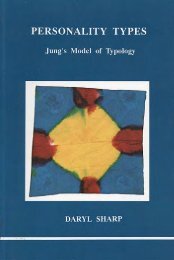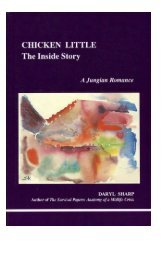Digesting Jung: Food for the Journey - Inner City Books
Digesting Jung: Food for the Journey - Inner City Books
Digesting Jung: Food for the Journey - Inner City Books
Create successful ePaper yourself
Turn your PDF publications into a flip-book with our unique Google optimized e-Paper software.
Relationship Problems in a Nutshell 53<br />
son; by quietly leaving <strong>the</strong> battlefield and tearing your hair out; by<br />
asking yourself—not your partner—what complex in you was activated,<br />
and to what end. The proper question is not, “Why is she doing<br />
that to me?” or “Who does he think he is?” but ra<strong>the</strong>r, “Why am<br />
I reacting in this way?—Who do I think he or she is?” And more:<br />
“What does this say about my psychology? What can I do about<br />
it?” Instead of accusing <strong>the</strong> o<strong>the</strong>r person of driving you crazy, you<br />
say to yourself, “I feel I’m being driven crazy—where, or who, in<br />
me is that coming from?”<br />
That is how you establish a container, a personal temenos, a private<br />
place where you launder your complexes.<br />
It is true that a strong emotion sometimes needs to be expressed,<br />
because it comes not from a complex but from genuine feeling.<br />
There is a fine line between <strong>the</strong> two, and it is extremely difficult to<br />
tell one from <strong>the</strong> o<strong>the</strong>r without a container. But when you can tell<br />
<strong>the</strong> difference you can speak from <strong>the</strong> heart.<br />
Working on a relationship involves keeping your mood to yourself<br />
and examining it. You nei<strong>the</strong>r bottle up <strong>the</strong> emotion nor allow<br />
it to poison <strong>the</strong> air. The merit in this approach is that it throws us<br />
back entirely on our experience of ourselves. It is foolish to imagine<br />
we can change <strong>the</strong> person who seems to be <strong>the</strong> cause of our heartache.<br />
But with <strong>the</strong> proper container we can change ourselves and<br />
our reactions.<br />
There are those who think that “letting it all hang out” is <strong>the</strong>rapeutic.<br />
But that is merely allowing a complex to take over. The<br />
trick is to get some distance from <strong>the</strong> complex, objectify it, take a<br />
stand toward it. You can’t do this if you identify with it, if you<br />
can’t tell <strong>the</strong> difference between yourself and <strong>the</strong> emotion that grabs<br />
you by <strong>the</strong> throat when a complex is active. And you can’t do it<br />
without a container.<br />
Those who think that talking about a relationship will help it get<br />
better put <strong>the</strong> cart be<strong>for</strong>e <strong>the</strong> horse. Work on yourself and a good<br />
relationship will follow. You can ei<strong>the</strong>r accept who you are and<br />
find a relationship that fits, or twist yourself out of shape and get










